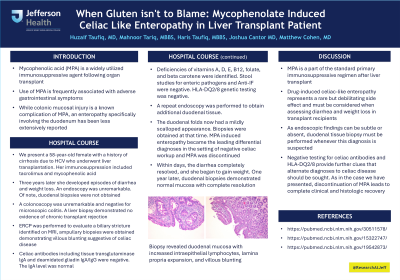Monday Poster Session
Category: Small Intestine
P3241 - When Gluten isn't to Blame: Mycophenolate Mofetil Induced Celiac Like Enteropathy in Liver Transplant Patient
Monday, October 28, 2024
10:30 AM - 4:00 PM ET
Location: Exhibit Hall E

Has Audio
- HT
Huzaif Taufiq, MD
Jefferson Torresdale Hospital
Willow Grove, PA
Presenting Author(s)
Award: Presidential Poster Award
Huzaif Taufiq, MD1, Mahnoor Tariq, MBBS2, Haris Taufiq, MBBS3, Matthew Cohen, MD4
1Jefferson Torresdale Hospital, Willow Grove, PA; 2Ziauddin University, Willow Grove, PA; 3Ziauddin University, Karachi, Sindh, Pakistan; 4Jefferson Torresdale Hospital, Philadelphia, PA
Introduction: Mycophenolic acid (MPA) is a widely utilized immunosuppressive agent following organ transplant. Use of MPA is frequently associated with adverse gastrointestinal symptoms. While colonic mucosal injury is a known complication of MPA, an enteropathy specifically involving the duodenum has been less extensively reported
Case Description/Methods: We present a 58-year-old female with a history of cirrhosis due to HCV who underwent liver transplantation. Her immunosuppression included tacrolimus and mycophenolate mofetil. Three years later she developed episodes of diarrhea with progressive weight loss. An endoscopy was unremarkable. Of note, duodenal biopsies were not obtained. A colonoscopy was unremarkable and negative for microscopic colitis. A liver biopsy demonstrated no evidence of chronic transplant rejection. During the performance of an ERCP to evaluate a biliary stricture identified on MRI, ampullary biopsies were obtained demonstrating villous blunting suggestive of celiac disease. Celiac antibodies including tissue transglutaminase IgA and deamidated gliadin IgA/IgG were negative.The IgA level was normal. Deficiencies of vitamins A, D, E, B12, folate, and beta carotene were identified. Stool studies for enteric pathogens and Anti-IF were negative. HLA-DQ2/8 genetic testing was negative. A repeat endoscopy was performed to obtain additional duodenal tissue. The duodenal folds now had a mildly scalloped appearance.Biopsies demonstrated marked intraepithelial lymphocytosis, partial villous blunting and marked deep crypt apoptosis without loss of goblet or paneth cells. MPA induced enteropathy became the leading differential diagnoses in the setting of negative celiac workup and MPA was discontinued. Within days, the diarrhea completely resolved and she began to gain weight. One year later, duodenal biopsies demonstrated normal mucosa with complete resolution
Discussion: MPA is a part of the standard primary immunosuppressive regimen after liver transplant. Drug-induced celiac-like enteropathy represents a rare but debilitating side effect and must be considered when assessing diarrhea and weight loss in transplant recipients. As endoscopic findings can be subtle or absent, duodenal tissue biopsy must be performed whenever this diagnosis is suspected. Negative testing for celiac antibodies and HLA-DQ2/8 provide further clues that alternate diagnoses to celiac disease should be sought. As in the case we have presented, discontinuation of MPA leads to complete clinical and histologic recovery
Disclosures:
Huzaif Taufiq, MD1, Mahnoor Tariq, MBBS2, Haris Taufiq, MBBS3, Matthew Cohen, MD4. P3241 - When Gluten isn't to Blame: Mycophenolate Mofetil Induced Celiac Like Enteropathy in Liver Transplant Patient, ACG 2024 Annual Scientific Meeting Abstracts. Philadelphia, PA: American College of Gastroenterology.
Huzaif Taufiq, MD1, Mahnoor Tariq, MBBS2, Haris Taufiq, MBBS3, Matthew Cohen, MD4
1Jefferson Torresdale Hospital, Willow Grove, PA; 2Ziauddin University, Willow Grove, PA; 3Ziauddin University, Karachi, Sindh, Pakistan; 4Jefferson Torresdale Hospital, Philadelphia, PA
Introduction: Mycophenolic acid (MPA) is a widely utilized immunosuppressive agent following organ transplant. Use of MPA is frequently associated with adverse gastrointestinal symptoms. While colonic mucosal injury is a known complication of MPA, an enteropathy specifically involving the duodenum has been less extensively reported
Case Description/Methods: We present a 58-year-old female with a history of cirrhosis due to HCV who underwent liver transplantation. Her immunosuppression included tacrolimus and mycophenolate mofetil. Three years later she developed episodes of diarrhea with progressive weight loss. An endoscopy was unremarkable. Of note, duodenal biopsies were not obtained. A colonoscopy was unremarkable and negative for microscopic colitis. A liver biopsy demonstrated no evidence of chronic transplant rejection. During the performance of an ERCP to evaluate a biliary stricture identified on MRI, ampullary biopsies were obtained demonstrating villous blunting suggestive of celiac disease. Celiac antibodies including tissue transglutaminase IgA and deamidated gliadin IgA/IgG were negative.The IgA level was normal. Deficiencies of vitamins A, D, E, B12, folate, and beta carotene were identified. Stool studies for enteric pathogens and Anti-IF were negative. HLA-DQ2/8 genetic testing was negative. A repeat endoscopy was performed to obtain additional duodenal tissue. The duodenal folds now had a mildly scalloped appearance.Biopsies demonstrated marked intraepithelial lymphocytosis, partial villous blunting and marked deep crypt apoptosis without loss of goblet or paneth cells. MPA induced enteropathy became the leading differential diagnoses in the setting of negative celiac workup and MPA was discontinued. Within days, the diarrhea completely resolved and she began to gain weight. One year later, duodenal biopsies demonstrated normal mucosa with complete resolution
Discussion: MPA is a part of the standard primary immunosuppressive regimen after liver transplant. Drug-induced celiac-like enteropathy represents a rare but debilitating side effect and must be considered when assessing diarrhea and weight loss in transplant recipients. As endoscopic findings can be subtle or absent, duodenal tissue biopsy must be performed whenever this diagnosis is suspected. Negative testing for celiac antibodies and HLA-DQ2/8 provide further clues that alternate diagnoses to celiac disease should be sought. As in the case we have presented, discontinuation of MPA leads to complete clinical and histologic recovery
Disclosures:
Huzaif Taufiq indicated no relevant financial relationships.
Mahnoor Tariq indicated no relevant financial relationships.
Haris Taufiq indicated no relevant financial relationships.
Matthew Cohen indicated no relevant financial relationships.
Huzaif Taufiq, MD1, Mahnoor Tariq, MBBS2, Haris Taufiq, MBBS3, Matthew Cohen, MD4. P3241 - When Gluten isn't to Blame: Mycophenolate Mofetil Induced Celiac Like Enteropathy in Liver Transplant Patient, ACG 2024 Annual Scientific Meeting Abstracts. Philadelphia, PA: American College of Gastroenterology.

